Auto logout in seconds.
Continue LogoutA third of Americans who believe Covid-19 vaccine misinformation do so despite knowing it contradicts established medical beliefs—highlighting a growing distrust in scientists and medical experts.
Radio Advisory: Aaron Carroll on how clinicians can combat medical misinformation
How Americans view Covid-19 misinformation
In a new report from The COVID States Project, researchers surveyed 18,782 Americans across all 50 states and the District of the Columbia between Dec. 22, 2021, and Jan. 24, 2022, to assess beliefs on Covid-19 vaccine misinformation.
In the survey, more than 16% of Americans said they believed one or more false vaccine statements is true. Specifically, 10% believed Covid-19 vaccines cause infertility, 8% believed the vaccines alter people's DNA, 7% believed the vaccines use aborted fetal cells, and 5% believed the vaccines contain tracking microchips. In addition, 46% of all respondents said they were unsure whether at least one of the false statements was true.
The report also found that differences in how respondents personally felt about a false vaccine statement and what they thought scientists believed about it. Overall, a third of respondents who believed one or more of the false vaccine statements were aware that their beliefs differ from those of scientists and medical experts. In addition, 21% of respondents said they were aware that scientists and experts considered a particular claim false, but were still unsure whether to believe them.
According to Axios, this suggests that educating people on the science behind the Covid-19 vaccines "won't be sufficient to change many minds."
How Americans feel about scientists and medical experts
In a separate poll from Pew Research Center, researchers surveyed 14,497 Americans from Nov. 30 to Dec. 12, 2021, to assess their confidence in different groups and institutions, including scientists and medical scientists.
Currently, most Americans still have at least a "fair amount" of confidence in scientists (77%) and medical scientists (78%)—a decline from figures throughout the pandemic and before it. Inversely, the share of people saying they have "no confidence" in either scientists or medical scientists has significantly increased over the course of the pandemic.
There are also significant partisan differences in how Americans currently view scientists and medical scientists. Only 63% of Republicans have at least a fair amount of confidence in scientists, while 66% said the same about medical scientists. In comparison, 90% of Democrats have at least a fair amount of confidence for both scientists and medical scientists.
(Owens, Axios, 2/15; Ognyanova et al., The COVID States Project, 2/14; Durkee, Forbes, 2/15; Kennedy et al., Pew Research Center, 2/15)
Listen to the Radio Advisory episode
Medical misinformation has been a significant problem for a long time, but amid the Covid-19 pandemic, the problem has become even more widespread. In this episode, host Rachel Woods sits down with Dr. Aaron Carroll, author, professor, and Indiana University chief health officer—to discuss what all clinicians should do to combat medical misinformation.
Plus, Advisory Board experts Solomon Banjo and Pam Divack offer their take on clinician’s role in online spaces (with patients and with each other) and translate those same principles for the rest of the industry.
Don't miss out on the latest Advisory Board insights
Create your free account to access 1 resource, including the latest research and webinars.
Want access without creating an account?
You have 1 free members-only resource remaining this month.
1 free members-only resources remaining
1 free members-only resources remaining
You've reached your limit of free insights
Become a member to access all of Advisory Board's resources, events, and experts
Never miss out on the latest innovative health care content tailored to you.
Benefits include:
You've reached your limit of free insights
Become a member to access all of Advisory Board's resources, events, and experts
Never miss out on the latest innovative health care content tailored to you.
Benefits include:
This content is available through your Curated Research partnership with Advisory Board. Click on ‘view this resource’ to read the full piece
Email ask@advisory.com to learn more
Click on ‘Become a Member’ to learn about the benefits of a Full-Access partnership with Advisory Board
Never miss out on the latest innovative health care content tailored to you.
Benefits Include:
This is for members only. Learn more.
Click on ‘Become a Member’ to learn about the benefits of a Full-Access partnership with Advisory Board
Never miss out on the latest innovative health care content tailored to you.

